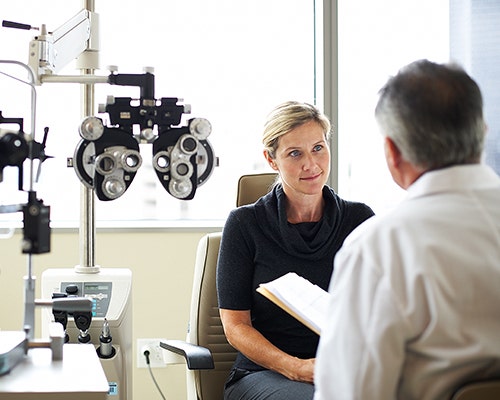Your Guide to Maintaining Optimal Eye Health
- 11/17/23


Eye-related conditions and associated vision problems are expected to increase by over 150% over the next 30 years, according to a 2020 report by the Lancet. Vision problems have many underlying causes, such as aging, too much screen use, unhealthy habits, and underlying medical conditions.
While you cannot control every factor that impacts your eye health, you can make healthy lifestyle changes that can support seeing clearly throughout your life. We’ve highlighted some of the best things you can do for your eye health and how to get started.
Wear Sunglasses
UV radiation from the sun can damage the cornea and lens of our eyes, just like it can damage our skin when we stay outside too long. Protect your eyes, just like you would your skin. Wear sunglasses with at least 99% UVA and UVB protection, particularly if you are outside when the sun is the strongest between 10 a.m. and 4 p.m.
Take a Break from Screens
Many of us spend way more time on screens than we should between work, smartphones, and TV. Constantly using a screen can cause eye strain, which can lead to headaches, blurred vision, and dry eyes.
The best thing you can do is take a break from screen usage periodically, every 20 minutes or so, where you look away from the screen. What’s even better would be taking a break from your desk every so often and moving around for a few minutes.
See Your Doctor
Start by understanding your family’s history of eye-related conditions such as glaucoma or macular degeneration and speak to your doctor about additional screenings you may require.
Managing other health conditions with regular physical and eye exams can help your body and eyes stay healthy. If you do have a medical condition that could impact your eyes, such as diabetes, stay in communication with your healthcare provider and follow the recommended treatment for your condition.
Eat a Healthy Diet
Your eyes need the right nutrients to be healthy, just like the rest of your body. Getting enough nutrients like vitamin A is essential for optimal vision.
Eating a whole food-based diet with plenty of fruits and vegetables is one of the best ways to make sure you are getting the nutrients you need for optimal eye health. Green vegetables in particular have been found to be beneficial for eye health, as they are a rich source of vitamin A, lutein, and zeaxanthin, nutrients that help support healthy eyes.
Get the Right Nutrients
Beyond a healthy diet, there are a few specific nutrients that have been found to be particularly beneficial for eye health. Healthy fats and carotenoids help lubricate and support the health of many parts of the eye, by providing protection from free radical damage.
For example, lutein is a carotenoid that operates as a powerful antioxidant, helping protect the eyes from damage. Black currants are also a rich source of carotenoids which have been found to be beneficial for supporting eye health.
If you are looking for a way to supplement your eye health nutrients, our new Herbal Eye Health product may be just what you are looking for. It contains a blend of healthy fats and plant-based extracts that contain many of the nutrients your eyes need.
Eye health is increasingly crucial in our screen-dominated world. Simple, proactive measures like protective eyewear, screen breaks, regular check-ups, and nutrient-rich diets can make a lasting impact. Prioritize your eye health today for clear vision throughout your life.
References:
-
Burton, M. J., Ramke, J., Marques, A. P., et al. (2021). The Lancet Global Health Commission on Global Eye Health: vision beyond 2020. The Lancet. Global Health, 9(4), e489–e551.
-
Protecting your eyes from the sun’s UV light. (n.d.). Retrieved September 14, 2023, from https://www.nei.nih.gov/about/news-and-events/news/protecting-your-eyes-suns-uv-light
-
Eyestrain. (2021, October 15). https://www.hopkinsmedicine.org/health/conditions-and-diseases/eyestrain
-
Vitamin A and Carotenoids. (n.d.). Retrieved September 14, 2023, from https://ods.od.nih.gov/factsheets/VitaminA-HealthProfessional/
-
Buscemi, S., Corleo, D., Di Pace, F., Petroni, M. L., Satriano, A., & Marchesini, G. (2018). The Effect of Lutein on Eye and Extra-Eye Health. Nutrients, 10(9). https://doi.org/10.3390/nu10091321
-
Cortez, R. E., & Gonzalez de Mejia, E. (2019). Blackcurrants (Ribes nigrum): A review on chemistry, processing, and health benefits. Journal of Food Science, 84(9), 2387–2401.
-
Al Mahmood, A. M., & Al-Swailem, S. A. (2014). Essential fatty acids in the treatment of dry eye syndrome: A myth or reality? Saudi Journal of Ophthalmology : Official Journal of the Saudi Ophthalmological Society, 28(3), 195–197.





